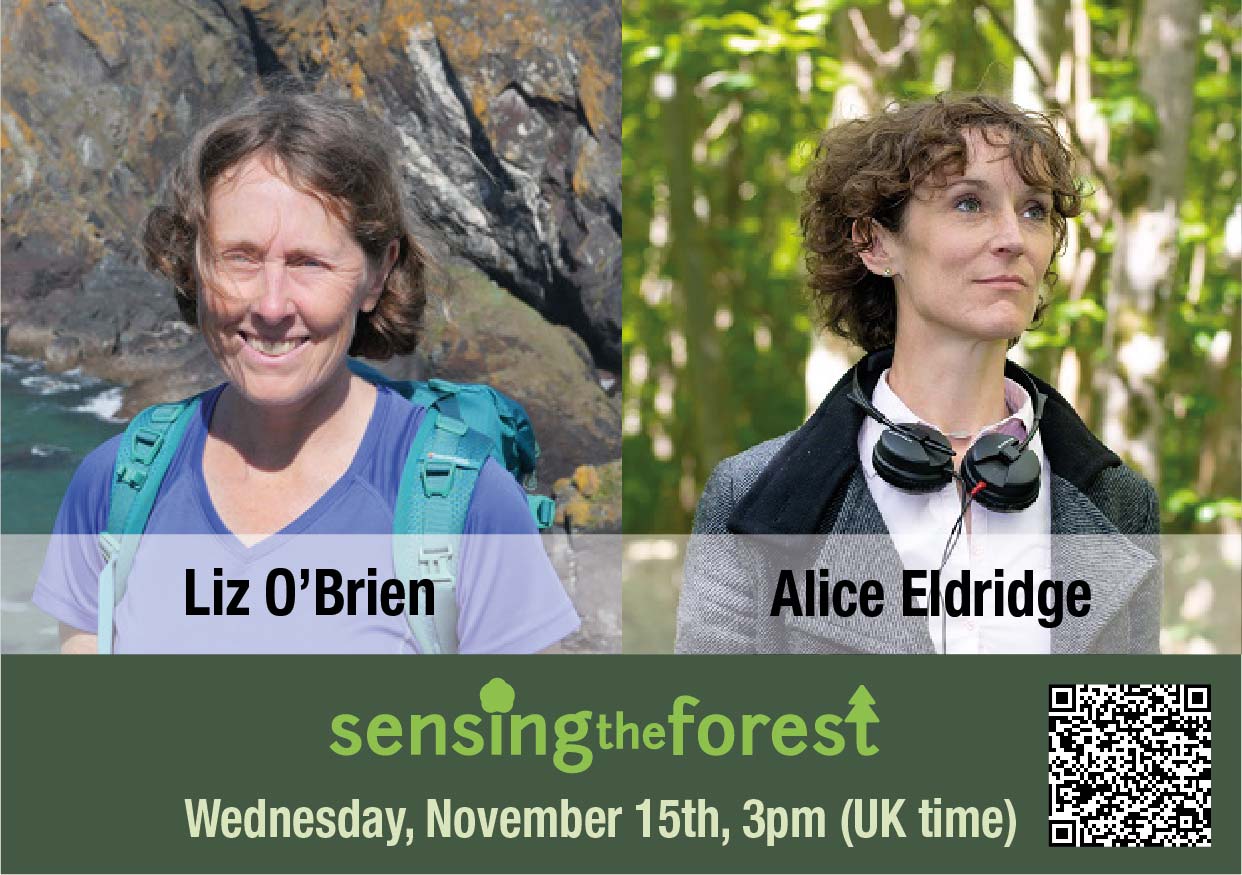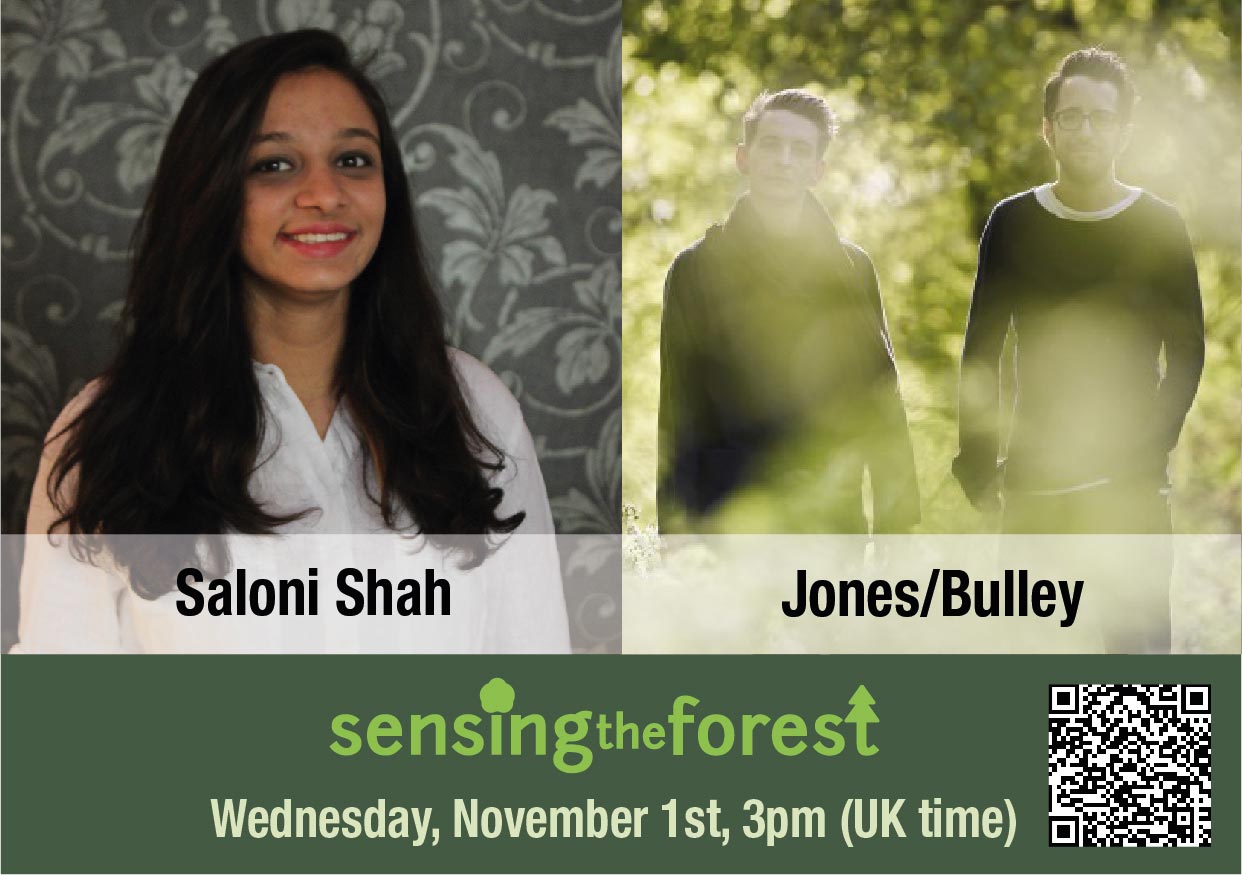Seminars
The AHRC Sensing the Forest project is organising a series of three fortnightly online seminar talks with experts related to artistic, social and scientific interventions in the forest or other natural landscapes with a special focus on acoustic phenomena. The seminar series will include talks by Semiconductor, Peter Sinclair, Saloni Shah, Jones/Bulley, Liz O’Brien and Alice Eldridge.
Many thanks for your interest in the seminar series. The first edition of the seminar series concluded with great success. We had a total of 275 registered attendees. You can:
🔥 Download the poster of the seminar series 🔥
🔥 Watch the video presentations playlist 🔥
🔥 Read the interviews with the seminar speakers 🔥
🔥 Leave comments / give likes to our blog posts & Sensing the Forest YouTube channel 🔥
🔥 Subscribe to our announce mailing list (Ask to join the group) 🔥
Wed, 15 Nov 2023 15:00 - 16:30 UK time

⭐ You can find more info and register for the free event on the following Eventbrite link ⭐
Liz O’Brien
Sounds in and of the Forest: Can We Connect People to Nature Through Sound?
Liz O’Brien will talk about the ecotones network which was interdisciplinary and brought together musicians, social scientists focused on health and wellbeing, conservation ecologist, and education to share knowledge and ideas. She will also touch on the ACCESS project which is trying to make social science accessible in tackling a range of environmental problems.
Liz O’Brien is a Principal Social Scientist in the Society and Environment Research Group at Forest Research, which is a government research institute. Her research explores human-forest relationships with a particular focus on the cultural ecosystem benefits of trees and woodlands including a strong focus on the health and wellbeing benefits of engagement with trees and woodlands – physical, mental and social. The team includes twenty social scientists undertaking research on land manager decision making and behaviours; the social dimensions of tree health; the health and wellbeing benefits of engaging with forests, and the social dimensions of wildlife engagement and management. Liz leads a five-year programme of research on the societal benefits of trees and forests for Forest Research. She has explored the impact of Covid-19 on engagement with nature. Liz is also involved in interdisciplinary research projects and collaborates with scientists in many parts of the world.
Alice Eldridge
Tuning in to Soundscape Dynamical Complexity
Natural soundscapes are dynamic, emergent patterns of acoustic activity which arise from the interactions between physical, biological and anthropogenic processes. The soundscape both reflects and influences ecological processes, and therefore provides valuable information about ecological status. Two paradigms currently dominate ecoacoustic analysis: automated recognisers, for example using deep learning to identify target species; or soundscape indices, which provide statistical or learned descriptions of the spectral or temporal structure of the global soundscape. Both show promise as cost-effective methods in environmental monitoring and fundamental research. Both also have limitations. One limitation is that they focus on the analysis and description of short, independent samples, obviating analysis of higher level spatio-spectro-temporal soundscape dynamics. In this talk I will share some initial results from our current research exploring a range of approaches to map, model and measure the dynamical complexity of soundscapes across temporal resolutions - from diel patterns, through chorus dynamics to short term temporal complexity. With this approach we integrate ecosemiotic and complex systems perspectives and develop a conception of the soundscape as a dynamic space of information flow.
Alice Eldridge is an interdisciplinarian with an interest in how sound organises systems. Her research integrates ideas and methods from music, cognitive science, computer science and ecology to advance theory and methods in ecoacoustics, as well as to create ecosystemic music. Alice holds a BSc in Psychology, an MSc in Evolutionary and Adaptive Systems, and a PhD in Computer Science and AI and is currently a Professor of Sonic Systems at the University of Sussex where she is joint director of the Sussex Digital Humanities Lab, co-director of the Experimental Music Technology Lab and a fellow of the Sussex Sustainability Research Programme.
Wed, 1 Nov 2023 15:00 - 16:30 UK time

⭐ You can find more info and register for the free event on the following Eventbrite link ⭐
Saloni Shah
How Information Design Can Save Forest Ecosystems
Join me for an insightful talk where we’ll delve into the art of crafting meaningful data storytelling projects focusing on forest conservation. In this session, we’ll explore the power of asking the right questions, unlocking the key to weaving compelling narratives that resonate with audiences and drive impactful change. As data becomes increasingly central to environmental efforts, particularly in the crucial domain of forest conservation, the ability to pose relevant and incisive questions is paramount. Drawing from my experience in the field, particularly in climate visualization, we’ll discuss the unique challenges and opportunities that arise when working with environmental data. Whether you are a data enthusiast, conservationist, or storyteller, this talk offers valuable insights into the nuanced art of questioning, empowering you to create compelling data-driven narratives that contribute meaningfully to the cause of forest conservation.
With a background encompassing data visualization, product design, and urban design, Saloni Shah excels at crafting innovative solutions that transcend traditional boundaries. Her specialization lies in creating impactful products that unveil intricate patterns within complex data, providing audiences with an immersive and engaging experience. Saloni’s academic achievements culminated in her award-winning thesis delving into how carbon markets impact forests, ecosystems, and indigenous communities. Throughout her career journey, Saloni continues to garner recognition through awards, talks, and workshops, solidifying her position as a thought leader in the intersection of design, data, and climate action.
Jones/Bulley
Living Symphonies
Living Symphonies is a landscape sound installation that portrays the thriving activity of a forest’s ecosystem, using a detailed ecological survey and real-time atmospheric data to create an ever-changing symphony that unfolds across the forest. In this talk, the artists will give an in-depth summary of Living Symphonies and its precursors. We will discuss the role of citizen science and “soft data” in its creation process, how composition can be approached as an ecological practice, considerations of spatiality and timescales in long-durational works, and the benefits and tensions of working with data as a compositional medium.
James Bulley (b. 1984) and Daniel Jones (b. 1983) are an artist duo whose collaborative practice explores the boundaries of sound art, music, and process-based composition. Their work draws on systems and patterns from the world around us as ways of organising sound, creating a reciprocal relationship between the two: using sound as a way to illuminate our understanding of the world, and using natural processes as a way to deepen our approaches to composition. Jones/Bulley’s critically acclaimed work has been shown at venues including the Royal Festival Hall, the Barbican, the Museum of Science and Industry, Aldeburgh Music, the Old Royal Naval College, the Queen Elizabeth Hall, and the Design Museum.
Wed, 18 Oct 2023 15:00 - 16:30 UK time
⭐ You can find more info and register for the free event on the following Eventbrite link ⭐
Semiconductor
Worlds in Flux: Semiconductor
Ruth Jarman, one half of artist duo Semiconductor, will give a talk introducing their practice and their approach to using scientific data of the natural world as a medium. Interested in the gap between how science represents the physical world and how we experience it, Semiconductor take scientific data as being a representation of nature and explore how to make this data tangible, using custom digital techniques to convert to audio, animation or 3d forms. She will focus on their two works Cosmos (2014) and Earthworks (2016). Cosmos is a sculpture created using the data from one year’s worth of measurements of the take up and loss of carbon dioxide from the trees in Alice Holt Forest. Earthworks is a multi-screen installation which translates seismic data from glaciers, earthquakes, volcanos and mining activity into audio and animation. Ruth will discuss Semiconductor’s creative process, how they approach research with scientists and within labs, and how they then go on to develop and realise artworks.
Semiconductor is UK artists Ruth Jarman and Joe Gerhardt. Over the past twenty-five years of collaboration they have become known for a unique and innovative body of moving image works, sculptures and installations which explore the material nature of our physical world and how we experience it through the lenses of science and technology. Their works bring into tangible experience that which is outside of what is humanly perceivable, confronting the viewer with information which is ordinarily outside of a human scale, both of time and space. Semiconductor’s works often evolve from intensive periods of research spent in science laboratories and universities. Residencies include the Physics Dept at University of Glasgow (2022 – ongoing); CERN, Geneva; NASA Space Sciences Laboratory; Mineral Sciences Laboratory, Smithsonian National Museum of Natural History, Washington DC; and the Charles Darwin Research Station, Galapagos.
Dr Peter Sinclair
Locustream Open Microphones - Acoustic commons : a shared resource to renew listening
Locustream Open Microphones is a project dedicated to capturing local soundscapes and transmitting them live via the Internet. Locustream is also a network of people who maintain these microphones and others who use the audio sources they generate for a variety of artistic and scientific purposes. The problem that drives this project, which has been evolving for more than 15 years now, concerns the way in which listening through mediatization (extended remote listening) can modify our perception of and our relationship to the environment.
Peter Sinclair (PhD, HDR) is a Sound Artist and professor of sound art practice at Aix-en Provence Art academy (ESA-Aix). He is internationally renowned for his sound installations as well as for his work on collaborative and participative environments. His artistic experimentations use networked games, mobile media, data sonification and live audio streaming. He is codirector of Locus Sonus Vitae a research group supported by the French Ministry for Culture and ESAAIX.